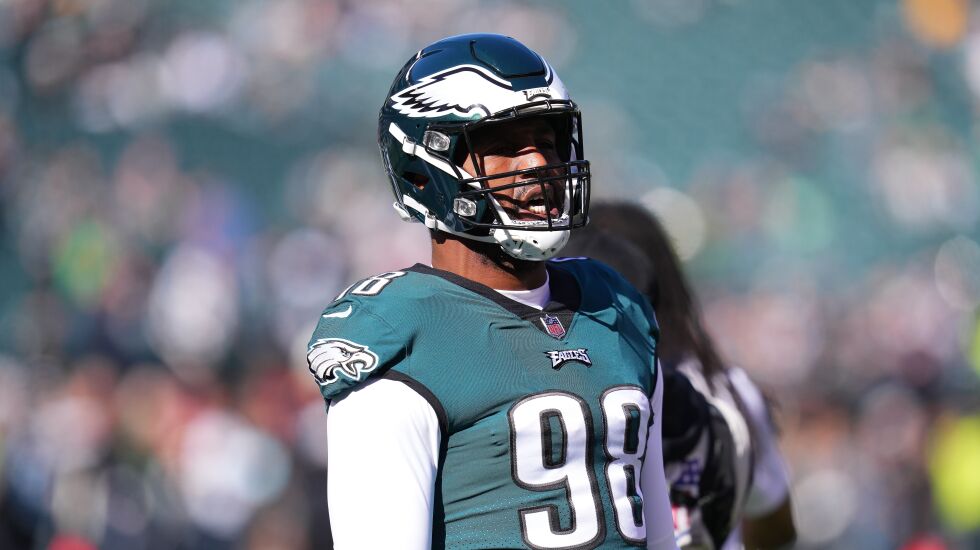
PHOENIX — The Bears’ single-season sacks leader stood on the floor of the Footprint Center, his trademark knit hat now midnight green and black instead of navy blue and orange.
Defensive end Robert Quinn never wanted to leave Chicago. It still bothers him that the Bears traded him to the Eagles on Oct. 26. But the result — a Super Bowl appearance in his 12th season after never winning as much as a playoff game until this season — was enough to coax a crooked smile out of him.
‘‘It was an unexpected journey that I went on,’’ Quinn said Monday, ‘‘but it seemed to work out well in the end.’’
Quinn didn’t want to uproot his family in the middle of the season. When general manager Ryan Poles dealt him for a fourth-round pick, he was furious.
‘‘Honestly, I was mad,’’ he said. ‘‘Highly upset [with] just how it went down. You pull into the building, and they say you’re getting traded. Especially in the middle of the year, it isn’t really a good feeling.
‘‘Especially after breaking the record. I thought that would help me.’’
Exactly 400 days ago Monday, Quinn set the Bears’ single-season sacks record when he tackled Giants quarterback Mike Glennon in the fourth quarter at Soldier Field. He added a half-sack in the Bears’ season finale to extend the record to 18½. He was the most decorated edge rusher on the NFL franchise best known for defense.
So much has changed since.
‘‘They had different plans for the organization and the team,’’ Quinn said, ‘‘and I just wasn’t a part of it.’’
That hurt, even though it seemed to be the obvious endgame all along. When Poles set about rebuilding the team, he traded fellow edge rusher Khalil Mack to the Chargers and let defensive tackle Akiem Hicks leave via free agency. But Quinn was left on the roster, even though it was clear his timeline didn’t match the Bears’ window to be competitive.
Quinn skipped mandatory minicamp, paying a $95,877 fine and saying he was more comfortable taking care of his body on his own. The absence wasn’t publicly contentious, though: When the Bears honored him with the Brian Piccolo Award, Quinn showed up.
He arrived at training camp on time. Even as Quinn struggled on a pop-gun Bears pass rush in 2022 — he had only one sack before the trade — he claimed he didn’t want to be anywhere else. On Oct. 20, he told the Sun-Times he was ‘‘happy as I can be’’ at Halas Hall. Six days later, the Bears traded him, paying $7.1 million of his salary to facilitate the move.
In return, Quinn agreed to void the final two non-guaranteed years of his contract, making him a free agent this offseason. What’s next? Retirement?
‘‘We’ll see where life takes it,’’ he said. ‘‘I’m a free agent. You never know what can happen.’’
Quinn struggled upon arriving in Philadelphia, notching two quarterback hits and no sacks in five games before being put on injured reserve with a knee injury. He returned from IR after arthroscopic surgery Jan. 7 and appeared in the regular-season finale and the Eagles’ two playoff games.
He played a combined 40 snaps in those three games and only six in the NFC title game against the 49ers. He still has yet to get a sack with the Eagles.
Adjusting to a smaller role was a challenge for Quinn, even if his peers— first-round draft pick Jordan Davis and veterans Brandon Graham, Fletcher Cox, Javon Hargrave, Josh Sweat, Haason Reddick, Ndamukong Suh and Linval Joseph — formed the deepest defensive line in the sport.
‘‘At first, it was a little weird,’’ Quinn said. ‘‘But [after] you start winning, it’s, ‘I can fulfill my role as long as we win.’ After a while, the adjustment came pretty easy for me. Winning makes it a lot easier.’’
The Bears’ defense plummeted after the trades of Quinn and linebacker Roquan Smith. With the two on their roster, the Bears allowed more than 20 points twice in six games. Once both were gone, the Bears gave up 25 or more points in every game for the rest of the season.
The loss of their two defensive leaders sucked out whatever life the Bears’ defense had left. One day after the season came to a merciful conclusion, defensive lineman Justin Jones — who inherited a captaincy when the veterans were dealt — was clear about the psychological effect of the trades.
‘‘It was a pretty big loss,’’ he said. ‘‘I’m not gonna lie.’’
The Eagles marched on. They allowed a league-low 4.8 yards per play and finished the season with 70 sacks. The next-closest team, the Chiefs, had 55.
Quinn, who will turn 33 in May, had spent his entire career — 12 seasons, 169 regular-season games and 3,781 defensive snaps — without winning a playoff game. In the last month, he has won as many playoff games — two — as he had appeared in during his career. He lost first-round playoff games with the 2017 Rams and the 2020 Bears.
On Sunday, he can win the Super Bowl.
‘‘Surreal,’’ he said. ‘‘Thinking back, my rookie year we went 2-14,’’ he said. ‘‘Now to make the Super Bowl, it’s two different ends of the spectrum. In Year 12, I’m trying to enjoy the moment and appreciate everything. . . .
‘‘I’m sure walking into the stadium it’ll finally start hitting me.’’







